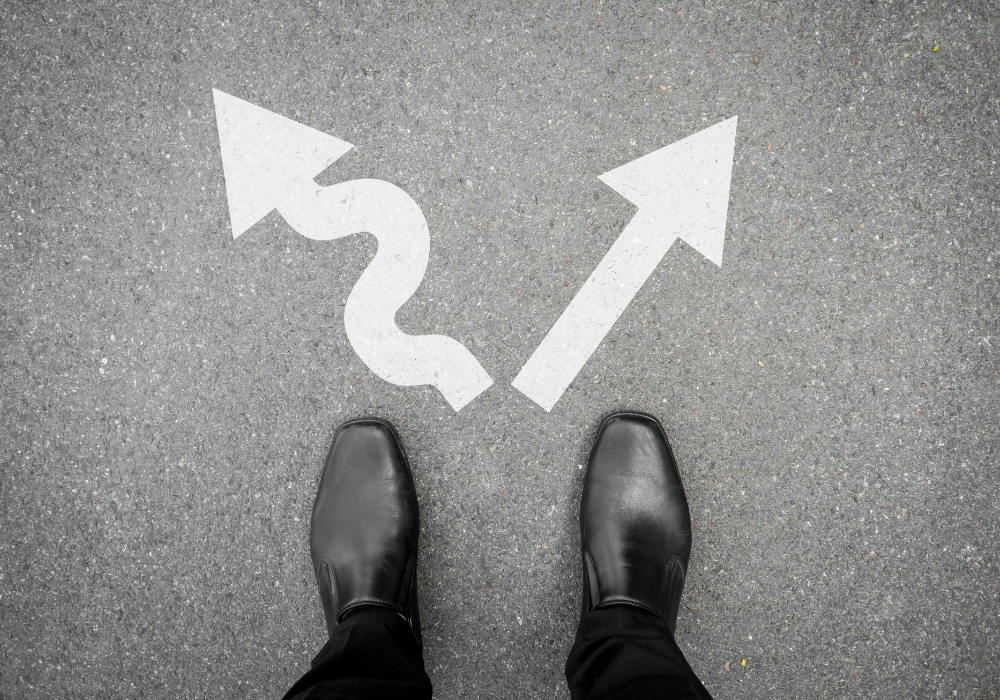Little decisions are piling up, and they’re quietly running your life.

Modern life demands constant choices—small ones, fast ones, endless ones. Every scroll, reply, and click adds another item to your brain’s invisible to-do list. Decision fatigue creeps in quietly, draining energy and making each task feel heavier than it should. It doesn’t show up all at once. It builds. Slowly, consistently, and often unnoticed until you’re knee-deep in indecision over something as simple as what to eat for lunch.
It’s not about being disorganized or bad at adulting. It’s about having too many mental tabs open with no time to reset. This kind of mental wear-and-tear isn’t loud—it’s subtle, and that’s what makes it dangerous. Choices that used to be automatic start feeling like brick walls. Momentum disappears. And before long, your entire day feels like wading through mud. That slow drag on your focus, mood, and motivation has a name—and it’s worth noticing.
1. The tiniest task suddenly feels like moving furniture with your brain.

That quick text reply or one-item grocery trip somehow becomes the most daunting part of your day. Not because it’s hard—but because it’s one more decision stacked on a teetering mental pile. Decision fatigue doesn’t discriminate. It turns even five-minute tasks into full-blown mental resistance. According to writers for The Decision Lab, “decision fatigue describes how the quality of our decision‑making declines as we make additional choices, as our cognitive abilities get worn out.”
What’s left undone starts haunting you. You remember it at the worst times—falling asleep, stuck in traffic, pretending to listen on a Zoom call. But instead of checking it off, you stall, push it off, and then spiral. Not because you’re flaky—but because your brain is maxed out. The clutter builds quietly, until it starts messing with your sleep and stress levels. Little systems—like batching boring tasks or setting auto-reminders—can bring sanity back. Because honestly, no one should feel defeated by printing a shipping label.
2. Every meal turns into an existential meltdown in front of the fridge.

Standing with the fridge door open feels like a ritual at this point. There’s food in there—but absolutely nothing you feel capable of assembling or choosing. Decision fatigue turns meals into chaotic mini-crises. It’s not hunger that’s the problem—it’s the indecision standing between you and the plate. Research from Futurity Food explains that decision fatigue often leads to unhealthy food choices—for example, participants under higher mental load were significantly more likely to choose chocolate cake over fruit salad.
By the time you finally eat, you’re either past the point of caring or deep in food guilt. It’s a mental tug-of-war between comfort, shame, effort, and convenience. And that’s before you even add in budget or health goals. The emotional weight of choosing dinner shouldn’t rival choosing a career, but decision fatigue makes everything feel that dramatic.
That’s why takeout wins, and “snack plates” become survival meals. Pre-decided meals and grocery staples help lower the stakes. Because food should fuel you—not make you want to cry over a bag of frozen peas.
3. Online shopping feels like a psychological thriller with no ending.

One innocent search for socks leads to 42 tabs, 19 comparisons, and an identity crisis over ankle versus crew. That’s not being indecisive—that’s decision fatigue setting up camp in your Amazon cart. Shopping becomes a marathon of micro-choices that somehow leave you more drained than delighted. Per Andrej Kras for InsideBE, choice overload—like seeing dozens of sock options—“can result in decision fatigue, sticking to the default option, or even avoiding making a decision altogether.”
Instead of a dopamine hit, you get mental static. Too many options, too much pressure to “get it right,” and way too many reviews that contradict each other. Even after buying, the decision doesn’t feel settled—it feels suspicious. Should you have waited for a sale? Chosen the organic bamboo blend? Returned everything and moved to the woods? Creating constraints—like a brand, price range, or time limit—can help you escape the quicksand. Decision fatigue isn’t about caring too much. It’s about your brain desperately trying to care less before it explodes from one more product comparison.
4. Saying “sure” becomes a survival tactic—not a real decision.

Plans you didn’t want. Favors you didn’t mean to accept. Obligations that sneak onto your calendar while your brain’s running on autopilot. That’s how decision fatigue weaponizes politeness. The quickest way to escape a choice becomes the default—and it usually sounds like “yeah, that’s fine.”
It’s not generosity. It’s self-preservation. Declining would take energy, explanation, or the risk of disappointing someone. And when your brain is fried, people-pleasing looks like the easier path. But later? That “sure” turns into resentment, exhaustion, and a full-body dread as the commitment creeps closer. Buying yourself a pause—saying “let me check and get back to you”—is a simple trick that gives you back power. Because once fatigue takes over, your calendar fills up with a bunch of yeses you never meant. And it’s hard to build a peaceful life when you agree to everything just to end the conversation.
5. The post-decision spiral turns wins into anxiety loops.

You picked the thing. Sent the message. Booked the appointment. And five minutes later, your brain’s back in panic mode, replaying the choice like a football coach analyzing bad plays. Decision fatigue doesn’t just steal clarity—it messes with your sense of finality.
Every decision feels sticky. Your mind gets trapped, replaying what-ifs and imaginary outcomes until confidence evaporates. Even the good calls start to feel suspicious. That’s not because you’re indecisive—it’s because your mental energy was already depleted before the decision even happened.
That means no reserve left to self-soothe or trust your instincts. The fix isn’t perfection—it’s closure. Start practicing “decide and delete”: make the call, shut the tab, walk away. The more often you cut off the spiral, the faster your brain learns to let go. It’s not about making flawless choices—it’s about finally leaving them behind.
6. Self-care turns into a checklist that just makes things worse.

Meditation, journaling, stretching, skin care, lemon water—self-care starts to feel like a second unpaid job. Decision fatigue doesn’t skip your wellness routine. It hijacks it, turning once-enjoyable habits into obligation-filled boxes to tick. Instead of rest, you feel pressure to “do it right” or keep up with trends.
The choice to relax becomes one more thing to optimize. And by the time you decide between yoga or a walk, the window for peace has closed. This isn’t self-care—it’s stress in a different outfit. Simplifying your go-to rituals or rotating just a few can make a huge difference. There’s nothing wrong with bubble baths and face masks, but when they come with 20 steps and decision dread, they stop feeling restorative. Peace isn’t productivity—it’s relief. And that starts by giving your tired brain fewer choices to fight through.
7. Focus disappears, even when there’s time and quiet.

The to-do list is clear. The room is quiet. The deadline is real. But the focus? Gone. Not hiding, not distracted—just vanished. Decision fatigue doesn’t just cloud big choices; it dulls your ability to start, stay with, and finish even simple tasks. Everything blurs into low-grade static.
It’s not laziness. It’s mental bandwidth running on fumes. With no fuel left for prioritizing, your brain keeps jumping between tabs, notifications, and snacks. Attention gets fragmented. Tasks take three times as long. And even when you finish something, it feels like it never really got your full brain. Routines and limits help—not as rules, but as rescue lines. Give yourself fewer places to direct attention, and focus becomes less of a fight. This isn’t a motivation problem. It’s the cost of too many choices. And the solution is often subtraction, not more effort.
8. Mornings feel scrambled before the day even starts.

Before coffee touches your lips, you’ve already made 20 tiny decisions—what to wear, which mug to use, whether to check your email, which playlist sets the right tone. It sounds harmless, but those early choices set the pace. And if they’re chaotic, the rest of the day usually follows suit.
Decision fatigue doesn’t wait until the afternoon slump. It starts at sunrise, stealing mental energy before you even leave the house. Creating a rhythm—not a rigid routine, but predictable defaults—can lighten that early load.
Having a go-to outfit, breakfast, or commute playlist can make mornings feel less like an obstacle course. You’re not behind on life. Your brain is just begging for fewer hoops to jump through before 9 a.m. The goal isn’t perfection. It’s ease. And that starts with doing less—not more—in the first hour of your day.
9. Boundaries get blurry because fighting back feels like too much work.

Saying no requires effort. Holding a line takes clarity. But when decision fatigue kicks in, that clarity melts. It becomes easier to just go with the flow—even if that flow carries you right into burnout. The brain, already worn thin, starts asking, “Is it really worth the fight?”
That’s how personal space erodes. One compromise becomes five. A small favor turns into a pattern. Before long, your time, energy, and even values get stretched thinner than you realized. It doesn’t happen in a blowout—it happens through quiet yeses you didn’t have the strength to challenge. Boundaries need rest to stay solid. If everything feels like too much, the first step isn’t saying no louder—it’s resting enough to say it at all. Protecting your peace starts with protecting your capacity. A burned-out brain can’t draw lines—it can only collapse under them.
10. Sleep suffers because your brain won’t stop reviewing the day.

The lights are off, your phone’s down, but your brain is wide awake rehashing every choice you made since breakfast. Did you say the wrong thing? Should you have skipped that meeting? Why didn’t you respond to that one message? Decision fatigue doesn’t clock out—it just shifts to night mode.
Sleep requires a sense of safety and closure. But if your brain’s been making nonstop calls all day, it doesn’t know how to shut up at night. The review loop kicks in automatically, spinning even small moments into what-ifs.
Setting a low-stimulation wind-down ritual—or just writing a “done for today” list—can signal your mind that it’s allowed to rest. Your brain isn’t failing. It’s just overloaded. Sleep isn’t always about blue light or melatonin. Sometimes it’s about giving your decisions a stopping point. Otherwise, the day never really ends—it just blurs into the next.